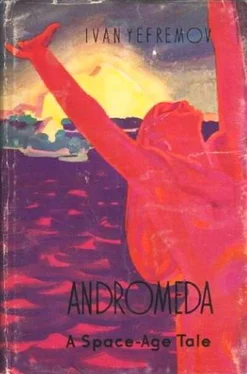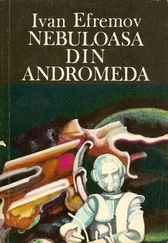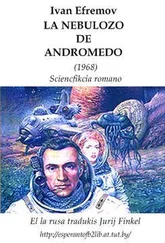Ivan Yefremov - Andromeda (A Space-Age Tale)
Здесь есть возможность читать онлайн «Ivan Yefremov - Andromeda (A Space-Age Tale)» весь текст электронной книги совершенно бесплатно (целиком полную версию без сокращений). В некоторых случаях можно слушать аудио, скачать через торрент в формате fb2 и присутствует краткое содержание. Город: Moscow, Год выпуска: 1959, Издательство: FOREIGN LANGUAGES PUBLISHING HOUSE, Жанр: Фантастика и фэнтези, на английском языке. Описание произведения, (предисловие) а так же отзывы посетителей доступны на портале библиотеки ЛибКат.
- Название:Andromeda (A Space-Age Tale)
- Автор:
- Издательство:FOREIGN LANGUAGES PUBLISHING HOUSE
- Жанр:
- Год:1959
- Город:Moscow
- ISBN:нет данных
- Рейтинг книги:5 / 5. Голосов: 1
-
Избранное:Добавить в избранное
- Отзывы:
-
Ваша оценка:
- 100
- 1
- 2
- 3
- 4
- 5
Andromeda (A Space-Age Tale): краткое содержание, описание и аннотация
Предлагаем к чтению аннотацию, описание, краткое содержание или предисловие (зависит от того, что написал сам автор книги «Andromeda (A Space-Age Tale)»). Если вы не нашли необходимую информацию о книге — напишите в комментариях, мы постараемся отыскать её.
Andromeda (A Space-Age Tale) — читать онлайн бесплатно полную книгу (весь текст) целиком
Ниже представлен текст книги, разбитый по страницам. Система сохранения места последней прочитанной страницы, позволяет с удобством читать онлайн бесплатно книгу «Andromeda (A Space-Age Tale)», без необходимости каждый раз заново искать на чём Вы остановились. Поставьте закладку, и сможете в любой момент перейти на страницу, на которой закончили чтение.
Интервал:
Закладка:
The robot tunneller had been working for twenty, days in the damp and gloom before it had finally cleared away the roof fall and bolstered up the ceiling. The road down into the cave was open and could be used as soon as it had been tested for safety. Other robots, small cars on caterpillar tracks, operated by Archimedean screws moved noiselessly down into the depths. At every hundred metres the instruments on the cars sent back reports on temperature, humidity and the content of the air. The cars cleverly overcame all obstacles and went down to a depth of four hundred metres. Following behind them Veda Kong and a group of historians descended into the treasure cave. Ninety years before that, when tests for subsoil waters were being made, indicators had shown a large quantity of metal amongst sandstone and limestone deposits that are not, in general, associated with metallic ores. It was soon discovered that the place coincided with a description of the site of a cave, Halovkul, that had been mentioned in old legends. The name had originally been Hall of Culture in a language now dead. During a terribly devastating war, people who had believed themselves the most advanced in science and culture, hid the treasures of their civilization in a cave. In those distant days secrecy and mystery were very widespread.
Veda was quite as excited as the youngest of her assistants as she slid down the wet, red clay that formed the floor of the sloping entrance tunnel.
Her imagination drew pictures of magnificent halls, hermetically sealed safes containing films, drawings and maps, cupboards of tape recordings or the recordings of memory machines, shelves with jars of chemical compounds, alloys and medicines, stuffed animals, now extinct, in air- and water-tight glass-cases, prepared plants and skeletons put together from the fossilized bones of the past inhabitants of Earth. She even dreamed of slabs of silicoll in which the pictures of the most famous artists had been cast, whole galleries of sculptures of mankind’s best representatives, the most prominent people, skilful carvings of animals… models of famous buildings, inscriptions about outstanding events perpetuated in stone or metal….
Lost in her dreams Veda Kong found herself in a huge cave between three and four thousand square metres in extent. The vaulted ceiling was lost in the darkness and long stalactites glistened in the electric light. The cave was truly magnificent and, in realization of Veda’s dreams, machines and cupboards had been placed in the countless niches formed in the walls by the ribs and ledges of limestone. With shouts of joy the archaeologists spread around the perimeter of the cave: many of the machines standing in the niches, some of them retaining the polish on their glass and metal parts, were motor-cars of the type that pleased our distant ancestors to such an extent and were considered the highest technical achievement of human genius in the Era of Disunity. In that period, for some unknown reason, people built large numbers of vehicles capable of carrying only a few passengers. The construction of the cars reached a high level of elegance, the engines and steering mechanisms were very ingenious but in all else these vehicles were senseless. Hundreds of thousands of them filled the city streets and country roads carrying people who lived far from the places where they worked and hurried every day to reach their jobs and then get home again. The vehicles were dangerous to drive, killed a tremendous number of people every year and burned up millions and millions of tons of valuable organic substances accumulated in the geological past of the planet and in so doing poisoned the atmosphere with carbon monoxide. The archaeologists of the Great Circle Era were very disappointed when they discovered how much room had been devoted to these machines in the cave.
On low platforms, however, there were more powerful steam engines, electric motors, jet, turbine and nuclear motors. In glass show-cases covered with a coating of limestone there were vertical rows of instruments of all kinds, most likely they were TV receivers, cameras, calculating machines and other similar devices. This museum of machines, some of which had quite rusted away but others were in a good state of preservation, was of great historical value as it illustrated the technical level of civilization at a distant date, the majority of whose records had been lost in political and military disturbances.
Miyiko Eigoro, Veda’s faithful assistant who had again given up her beloved sea for the damp and darkness of underground exploration, noticed the black opening of a gallery at the far end of the cave, behind a big limestone pillar. The pillar turned out to be the limestone-covered skeleton of a machine and at its foot lay a heap of plastic dust, the remains of the door that had once covered the entrance to the gallery. Advancing step by step, guided by the red cable of the scouting machines, the archaeologists got into the second chamber that was almost at the same level and was filled with hermetically sealed cupboards of metal and glass. A long English inscription in big letters ran round the vertical walls that had, in places, collapsed. Veda had to stop for a moment to decipher it.
With the boastfulness that was typical of the ancient individualists, the builders of the caves informed their descendants that they had reached the heights of knowledge and were preserving their magnificent achievements for posterity.
Miyiko shrugged her shoulders contemptuously.
“The inscription alone tells us that the Hall of Culture belongs to the end of the Era of Disunity, to the last years of the old type of social order. This foolish confidence in the eternal and unchanging continuation of their civilization, language, customs, morals and in the majesty of the so-called ‘white man’ is typical of the period!”
“You have a clear conception of the past, but it is somewhat one-sided, Miyiko. Through the grim skeleton of moribund capitalism I see those who struggled for a better future. Their future is our ‘today.’ I see countless men and women seeking light in a narrow impoverished life — they had strength enough to fight their way out of its captivity and goodness enough to help their friends and not harden their hearts in the suffocating morals of the world around them. And they were brave, recklessly brave.”
“But it was not they who hid their culture here,” objected Miyiko. “Just look, there is nothing but machines, technology, here. They wallowed in machines, paying no attention to their own moral and emotional degradation. They were contemptuous of the past and blind to the future!”
Veda thought that Miyiko was right. The lives of the people who had filled those caves would have been easier if they had been able to compare that which they had achieved with that which still had to be done before the world and society could be really transformed. Then their dirty, sooty planet, with its felled forests and litter of paper and broken glass, bricks and rusty iron, would have been seen in its real light. Our ancestors would have had a better understanding of what still had to be done and would not have blinded themselves with self-praise.
A narrow well, thirty-two metres deep, led down to the next cave. Veda sent Miyiko and two other assistants back for the gamma-ray apparatus to examine the contents of the cupboards and herself went to examine the third cave that had not been affected by lime and clay deposits. The low, quadrangular plate-glass show-cases were only misty from the damp that had penetrated into the cave. Pressing their faces against the glass the archaeologists saw the most remarkable articles of gold and platinum decorated with precious stones. Judging by the workmanship these ancient relics had been collected at a time when people still had more respect for the old than for the new, a habit that had come into being in very ancient days when people worshipped their ancestors. As Veda looked at the collection she felt the same disappointment in the people of olden days as she had done when she read the inscription on the wall: she was annoyed at the absurd self-confidence of the ancients who believed that their idea of values and their tastes would continue unchanged for dozens of centuries and would be accepted as canons by their descendants.
Читать дальшеИнтервал:
Закладка:
Похожие книги на «Andromeda (A Space-Age Tale)»
Представляем Вашему вниманию похожие книги на «Andromeda (A Space-Age Tale)» списком для выбора. Мы отобрали схожую по названию и смыслу литературу в надежде предоставить читателям больше вариантов отыскать новые, интересные, ещё непрочитанные произведения.
Обсуждение, отзывы о книге «Andromeda (A Space-Age Tale)» и просто собственные мнения читателей. Оставьте ваши комментарии, напишите, что Вы думаете о произведении, его смысле или главных героях. Укажите что конкретно понравилось, а что нет, и почему Вы так считаете.











